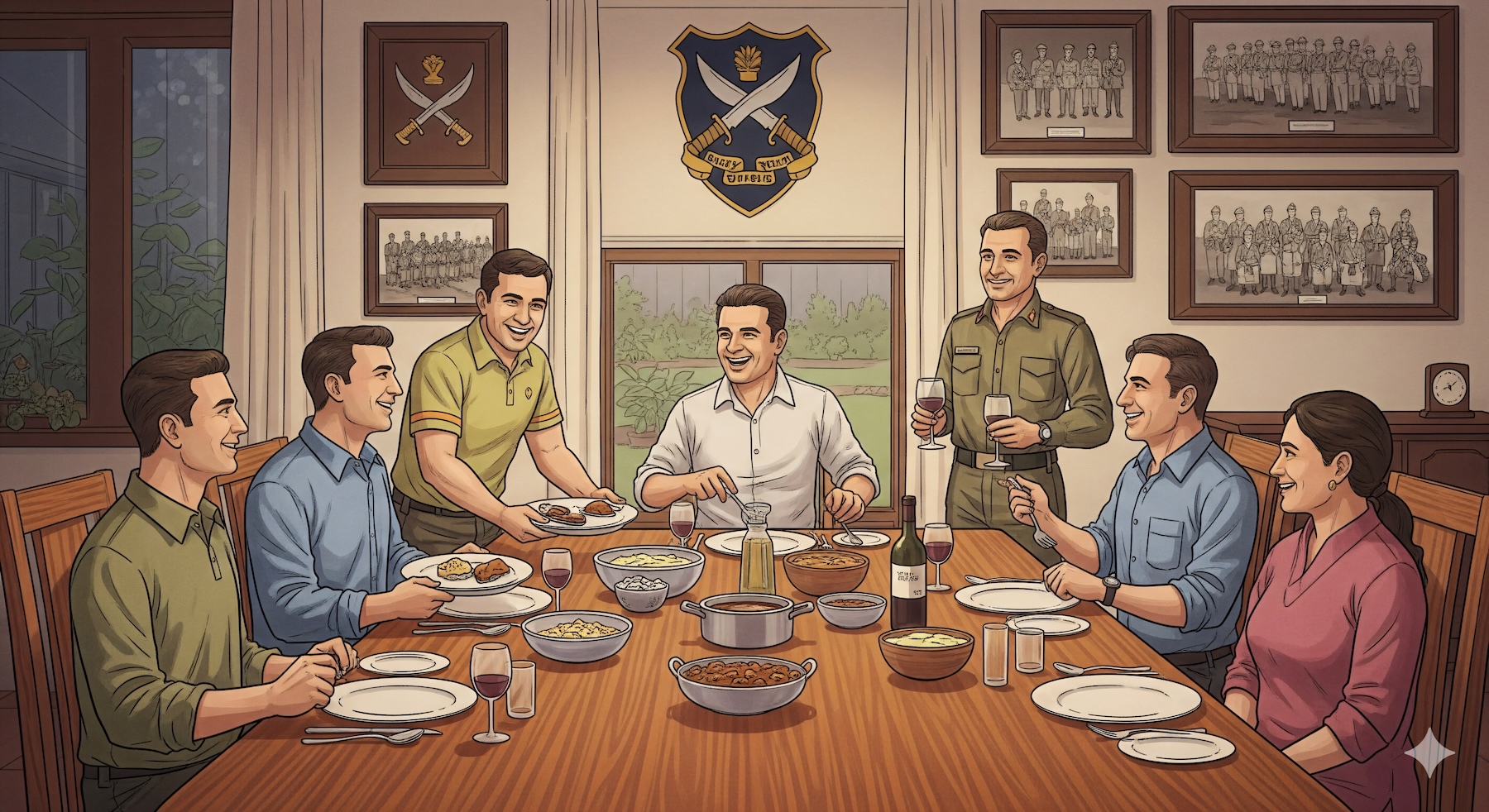Seven Plates, No Plan
In the Army, formal Calling On is an art in itself, meant to pay respects, strengthen bonds and welcome officers and their families. It’s done with care, with perfect courtesy and with that effortless discipline the fauj is known for.
But alongside this polished tradition exists another—unwritten, informal and just as beautiful. The kind where young officers, bound not by protocol but by affection, suddenly decide to drop into a senior’s home and declare with cheerful certainty: “Dinner will be here tonight!”
That evening, five of them—two lieutenants and three captains—arrived with their usual mix of energy and charm. There was nothing careless in their ways. Even in their casual attire their manners never slipped—polite greetings, respect woven into every word. Yet the warmth was unmistakable; it wasn’t just friendship, it was that unique fauji bond where regimental ties make family out of rank.
As I welcomed them in, the two lieutenants grinned and instantly announced: “Ma’am, today we are your assistant chefs!” It was said with such mock gravity that for a moment I wondered if they had really trained under some secret culinary academy for officers on field postings—because in the Army, you never know what hidden talents surface at the oddest times.
Dinner for seven? On such short notice? That might be a crisis for others but for a fauji home, it’s never a crisis. Within a minute the menu was settled. Eggs—always there. Chicken—thankfully stocked in my fridge. Rice—simple, quick and filling. And custard—naturally. Because for officers, custard is not just dessert, it’s nostalgia.
One of the lieutenants immediately volunteered for it. “This is mine, Ma’am,” he said with confidence. “I’ve been doing this since school days.” Then came the hilarious stories of his residential school—how boys would quietly slip into the dining hall at night to raid the kitchen for custard bowls, how one clever classmate once drank it straight from the serving jug before anyone could stop him and how fights would break out over the last spoonful. At NDA, he added with a twinkle, custard became the weekly treat—lined up neatly with jelly, devoured with a discipline that masked the same schoolboy mischief bubbling underneath. A captain chuckled, “So your tactical training started in the pudding section!” and the room shook with laughter.
Another young officer took up egg bhurji duty with the seriousness of a man preparing for a field exercise. Eggs cracked, onions sizzled, green chilies were added with daring enthusiasm and suddenly the kitchen was running like a mini operation. The captains, of course, stood leaning on the counter, thoroughly enjoying the show. One of them remarked dryly to the lieutenant, “Your knife skills look less like chopping onions and more like bayonet practice!” That sent everyone into peals of laughter, while the poor lieutenant pretended to defend his “technique” with military pride. Another captain added, “Careful or we’ll have to declare this bhurji a battlefield casualty!”
Meanwhile, I worked on the chicken and supervised the rice while my husband, with his usual calmness, took complete charge of drinks and snacks in the living room. He observed the cheerful chaos with the patience of a man who had sat through countless tactical briefings probably thinking, at least here the outcome is guaranteed to be delicious.
There was laughter, there were trips back and forth from kitchen to lounge, there were taste tests done with great ceremony, always with exaggerated nods as though they were judging a MasterChef final. It wasn’t chaos, it was harmony in action. Everyone had a role, everyone pulled their weight and the house rang with that unmistakable sound of fauji bonds in motion.
When dinner was ready, I naturally moved to serve but the officers stopped me firmly. “Not tonight, Ma’am,” they said. “Tonight you sit. We will serve.” And they did. It wasn’t about pampering, nor about formal respect, it was the simple, heartfelt courtesy of younger brothers fussing over an elder sister, making sure she felt part of their world.
The meal itself turned out wonderful. The chicken was tender, the rice fluffy, the bhurji perfectly spiced and then came the custard. Golden, smooth, exactly right. Served last, just as tradition demands. The pride on that lieutenant’s face as he presented it was unforgettable and the others clapped him on the back as though he had just cleared another academy drill. One captain teased, “Forget medals, this deserves a mess dinner toast in your honour!”
That night wasn’t about food at all. It was about belonging, about brotherhood, about the unique way the Army makes strangers into family.
Today, so much has become more formal… planned dinners, RSVP cards, menus finalized well in advance. But back then, the most memorable evenings were the unplanned ones. When young officers walked in, filled your house with laughter and left behind the warmth of a tradition no rulebook can capture, sealed with a perfect bowl of custard.
